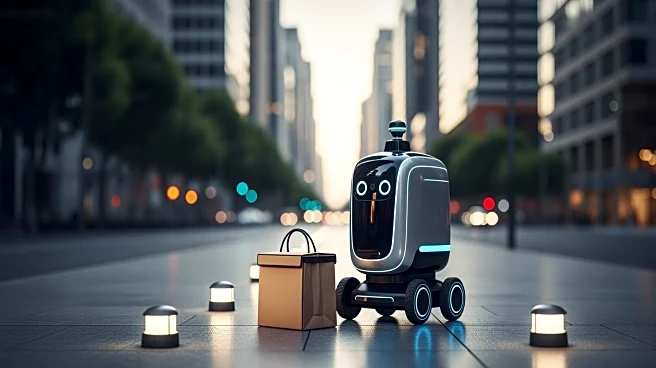What's Happening?
Grubhub has partnered with Avride to test autonomous delivery robots in Jersey City, marking a significant step in the evolution of food delivery services. This initiative follows the deployment of 100
Avride robots on college campuses across North America, including a large-scale operation at The Ohio State University. The robots are designed to navigate complex urban environments, dealing with mixed traffic and pedestrian interactions while adhering to local regulations. The partnership aims to enhance delivery efficiency and safety, leveraging Avride's advanced robotics and Grubhub's extensive marketplace.
Why It's Important?
The collaboration between Grubhub and Avride represents a shift towards more sustainable and efficient delivery methods. Autonomous delivery robots can significantly reduce carbon emissions and traffic congestion by removing vehicles from roads. Additionally, they offer safety benefits by minimizing human error-related accidents. This innovation could transform the delivery industry, providing cost-effective solutions for businesses and consumers. The success of this pilot could lead to broader adoption of autonomous delivery systems, potentially reshaping urban logistics and supporting local economies by increasing order volumes for restaurants.
What's Next?
Following the pilot in Jersey City, Grubhub and Avride plan to expand their autonomous delivery operations to other urban areas and university campuses. Avride is also preparing to launch a robotaxi service in Dallas by December 2025, indicating a broader application of their autonomous technology. The success of these initiatives could encourage further investment and development in autonomous delivery and transportation solutions, potentially leading to widespread changes in how goods and services are delivered in urban environments.
Beyond the Headlines
The introduction of autonomous delivery robots raises questions about the future of employment in the delivery sector. While these robots offer efficiency and safety benefits, they could displace traditional delivery jobs. However, there is potential for new roles in managing and maintaining these robotic fleets. Additionally, the technology's success depends on public acceptance and regulatory support, as well as the ability to navigate complex urban landscapes without causing disruptions.








